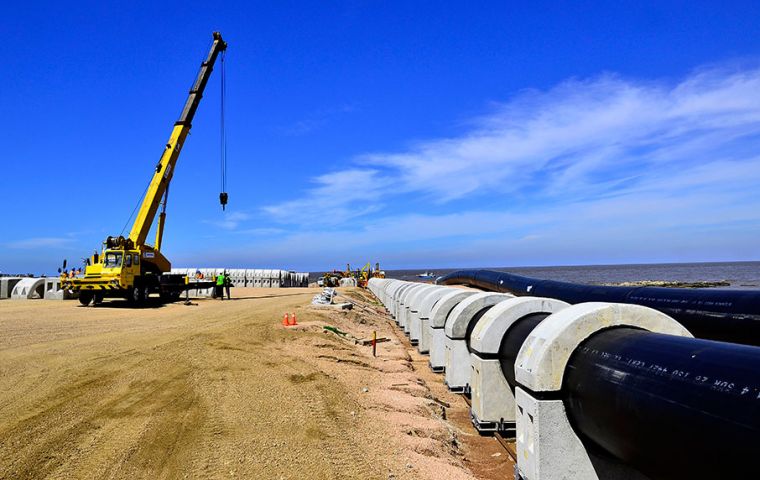MercoPress. South Atlantic News Agency
IDB US$ 60m loan to expand sewage and rainwater drainage in Montevideo
 Work will also be carried out to complete a liquid waste disposal system in the west of the city. This will help improve water quality in Montevideo and nearby beaches.
Work will also be carried out to complete a liquid waste disposal system in the west of the city. This will help improve water quality in Montevideo and nearby beaches. Uruguay will expand sewage and rainwater drainage systems in Montevideo and improve management of City Hall's sanitation system thanks to a US$60 million loan approved by the Inter-American Development Bank (IDB). The money represents the second stage of a line of credit that the IDB approved for investment projects in December 2006.
The loan will finance Montevideo's V Urban Sanitation Program, which will expand the scope of the sewage grid and ease problems with rainwater drainage and pollution in Montevideo Bay. It also aims to boost efficiency at the sanitation division of the Montevideo City Hall.
“One of the features that should be highlighted is the execution of a home-to-home connection plan, based on work with the target population so that they quite truly connect to the sanitation network that will be built,” said Tania Páez, IDB Project Team Leader.
The program will finance sewage and rainwater drainage work in the district known as Barrio Manga, which will benefit approximately 20,000 people. Work will also be carried out to complete a liquid waste disposal system in the west of the city. This will help improve water quality in Montevideo Bay and nearby beaches.
Crews will build 43.6 kilometres of sewage lines and collectors, 3.8 kilometres of pressure pipes, a pumping station, 6.4 kilometres of micro- and macro-drainage equipment, and an overflow control structure with a 4,000 cubic meter capacity. All of this is designed to expand the sewage and rainwater drainage systems in the Barrio Manga and the pumping stations in Miguelete, La Teja and Belvedere-Victoria, which are part of the city's Western Final Disposal System.
The plan features a management improvement component that will finance an upgrade of the list of sanitation system users at the Montevideo City Hall. This will include an upgrade of the computer system; development and implementation of a plan to incorporate and manage special users (those with their own sources of water and large-scale users); and the design of a home-to-home connection system that will be carried out in the Casabó and Manga districts of the city.
It is estimated that when the program is completed, 43% of homes in Manga and Casabó will be connected to the sanitation grid, 100% of the waste water collected in Montevideo will have a proper final disposal, and revenue from the enhanced system will increase by 32%.
The IDB loan of US$60 million will be over 25 years with a grace period of five and a half years and an interest rate pegged to the LIBOR. The local contribution will be US$9.8 million.




Top Comments
Disclaimer & comment rules-

Read all commentsAbout bleeding time.
Nov 26th, 2016 - 07:01 pm 0Commenting for this story is now closed.
If you have a Facebook account, become a fan and comment on our Facebook Page!